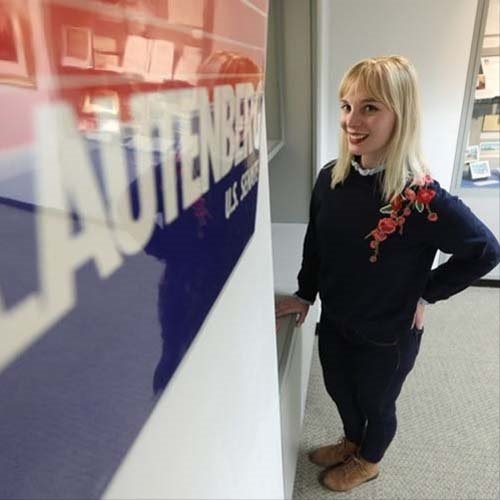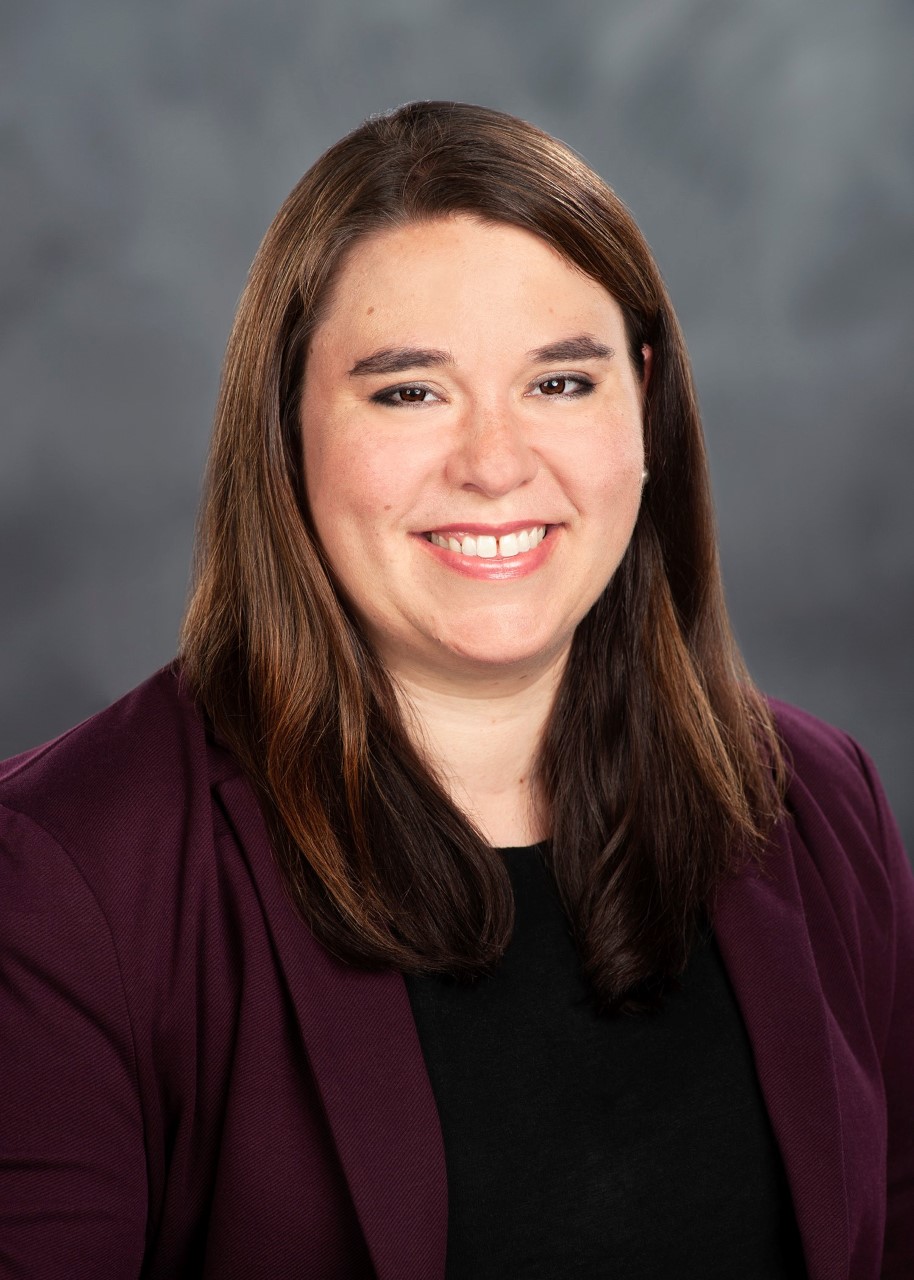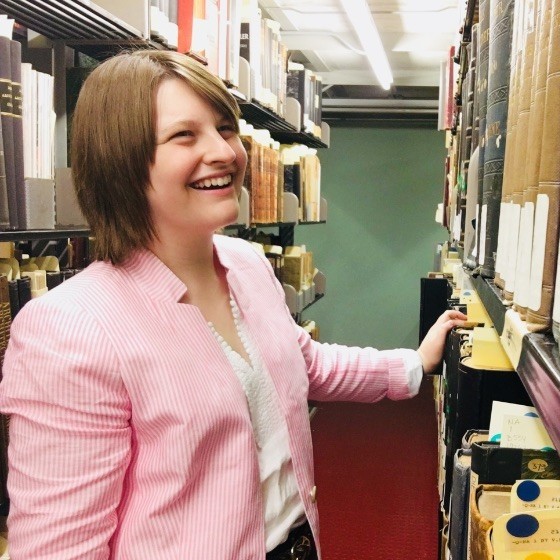- About Archives
- About SAA
- Careers
- Education
- Publications
- Advocacy
- Membership
Thank you to all our excellent candidates for standing in the 2022 Congressional Papers Section election. Please take some time to review their candidate statements and get to know them so you can make an informed choice.
You will be voting for:
Ballots will be managed by SAA staff through Survey Monkey; keep an eye on your inbox for when the ballot opens.
The following candidates are running for the Vice-Chair/Chair-Elect position:

Sheridan Sayles
Technical Services Archivist, Seton Hall University
Sheridan Sayles is currently serving as the Technical Services Archivist at Seton Hall University. She has previously worked as Assistant Archivist at Trinity Church on Wall Street and Archivist for the Senator Frank R. Lautenberg Papers at Rutgers University. Her primary duties center around processing and processing management and has seven years of experience in working with both Congressional and political papers. She is an active member of the Society of American Archivists as well as the Mid-Atlantic Regional Archives Conference, holding leadership positions in both groups.
Sheridan has served on the Congressional Papers Section Steering Committee for two years and has been active with the Electronic Records Committee of CPS since 2017. Through this involvement, she has seen the intersection of Congressional and Digital records and the hiccups that archivists face in accessioning, collecting, and processing these materials. Her focus, if elected, would be in creating resources for archivists working directly with these records.
The following candidates are running for the three open seats on the section steering committee:

Mandy Bernard Lignelli
Archivist, History Associates Incorporated
I earned my MSLIS from The Catholic University of America in Washington, D.C., where, as a recipient of a Graduate Library Preprofessional scholarship, I spent two years working in the University’s Special Collections while taking classes. For my first project, I processed the personal papers of former U.S. Ambassador to the Holy See Mary Ann Glendon.
In my current role as an archivist at History Associates Incorporated (HAI)—headquartered in the D.C. suburb of Rockville, Maryland—processing and appraising congressional papers is one of my primary responsibilities. When I started at HAI last summer, I joined a team of archivists tasked with processing the papers of a former U.S. Senator over the period of about eighteen months. To date I have processed two sub-series and am currently in the midst of applying a unique standard for de-selection to the largest sub-series—making up more than half of the entire collection. Through this experience and some of the other short-term projects I have been assigned to, I have become acquainted with the challenges that come with congressional papers—from asserting control over their unwieldy size to navigating the politics of their management and disposition.
As an early career archivist living and working in the capital area, I embrace my nomination to the Steering Committee of the Congressional Papers Section as an opportunity to gain expertise in the niche from which I expect many projects in my future will emanate. For my part, I would like to further archivists’ study of the actual and potential uses of congressional papers—not merely to justify the effort and expense of processing and maintaining them, but to better understand their research value. In “New Perspectives on Congressional Collections” (2018), for instance, Maurita Baldock and J. Wendel Cox point to the decline in the use of congressional papers in recent decades as top-down historical research has fallen “out of scholarly favor.” Interestingly, though, Baldock and Cox identify those interested in American Indian history as a promising user group for congressional papers, given “the role of Congress in the unique nation-to-nation relationship with tribes.” As a member of the Steering Committee, I would encourage the Section to leverage its insights about congressional papers to further promote their use and enhance their accessibility.

Kate Gregory
Assistant Professor/Political Papers Archivist, Mississippi State University Libraries
I am currently a member of the steering committee and would like to continue my service for another term, primarily because I hope another term will afford me the opportunity at some point to work with the section in person and meet some of you all. I joined the steering committee in May 2020 and have yet to attend SAA in person. I am so hopeful for the chance to meet and connect with more of you.
At MSU, I am the archivist for the Senator John C. Stennis Papers and the G.V. “Sonny” Montgomery Papers, which total to about 6,500 cubic feet. In addition, I work with the papers of Congressman Mike Espy, Congressman Chip Pickering, Senator Marsha Blackburn, and Congressman Gregg Harper, among several other congressional collections and congressional staffers’ papers. In my first term on the Steering Committee, I have helped plan CPS Day programming and worked with the task force on the supplement to Managing Congressional Collections. I am also a member of the Electronic Records Committee. In a second term on the Steering Committee, I would like to continue my involvement with the supplement project and make progress on that, help grow involvement in CPS, plan engaging programming for the group, and discuss DEI ideas, initiatives, and issues surrounding the work that we do.
I hope you will consider allowing me to continue my service to this section. I appreciate you all giving me a chance to serve. Thank you!

Katie Jakovich
Archivist, History Associates Incorporated
I earned my MSIS, with a focus on Archiving and Preservation, from the University of Texas at Austin and my BA in History from Rhodes College. I worked in libraries and archives for the entirety of my time both at Rhodes and UT Austin, gaining experience with photographic collections and outreach, in particular.
Since May 2021, I have been part of a team processing a Senate collection at History Associates Incorporated (HAI). I recently worked on the closeout of another Senator’s office as well, helping prepare and inventory records for shipment to a repository. My work with these records has increased my existing interest in congressional papers and my desire to contribute to the field through participation in the SAA Congressional Papers Section.
Though I am somewhat new to working with congressional papers, I have learned invaluable lessons about the importance of collaboration and communication when working on a large collection, especially as part of a growing team. Additionally, I have witnessed and experienced the challenges of reckoning with external parties, who frequently have their own goals and expectations. Though not unique to a professional services firm like HAI, our archivists occasionally face the dilemma of balancing our professional responsibilities and the expectations of our clients.
As a member of the Steering Committee, I believe I can bring a new professional’s insights on congressional papers and ideas on outreach and engagement within the archival community. Due to the discretion archivists must exercise in our work on such collections, it is especially critical that we communicate and connect amongst ourselves so that we may continue to build a community of learning, support, and symbiosis.

Sara Stefani
Modern Political Papers Archivist, Indiana University Bloomington
I have been working with Congressional Papers for about four years, since June 2018. During that time, I have been an Archivist with the Modern Political Papers collection of the Indiana University Bloomington Libraries. My primary responsibility is for the Richard G. Lugar Senatorial Papers, but I am also responsible for the Mike Pence Congressional Papers and the Dan Burton Congressional Papers. More recently, I assisted with bringing the Susan W. Brooks Congressional Papers to our repository.
I received my Masters in Library Science degree with a specialization in Archives and Records Management from Indiana University in May 2018. It was just a month later that I started my position with the IU Libraries. Although previously I had had experience working for a rare books and special collections library and also with our University Archives and other archival collections, when I first started working with Congressional papers, I quickly realized that these collections can be very different from other archival collections. Their size, the different variety of materials and formats they contain, and what I think of as the unique space they occupy between personal and institutional papers, made them a different beast than the other collections I had worked with. My educational background was not in Political Science, but in Russian literature, so I had to learn a lot about politics and political papers very quickly!
Luckily, I had some very good colleagues who recommended some excellent resources for me. I also immediately subscribed to SAA’s Congressional Papers Section, and also connected with the Association of Centers for the Study of Congress. I still remember what it was like when I first started working with these collections, and I still come across new questions every day. I think that SAA’s Congressional Papers Section has an important role to play as a resource for new archivists in this field, as well as seasoned archivists, and also archivists who don’t consider themselves to be specialists, but who have received a congressional collection. I think that there are a lot of features that can benefit the membership of CPS and foster a sense of community: coffee chats, blog posts from members, invited talks, and lists of resources and bibliographies of materials. I’d like to see a series of workshops or mini-conferences take place during the year, and I’d like to create a platform that different institutions can use to advocate for congressional collections.